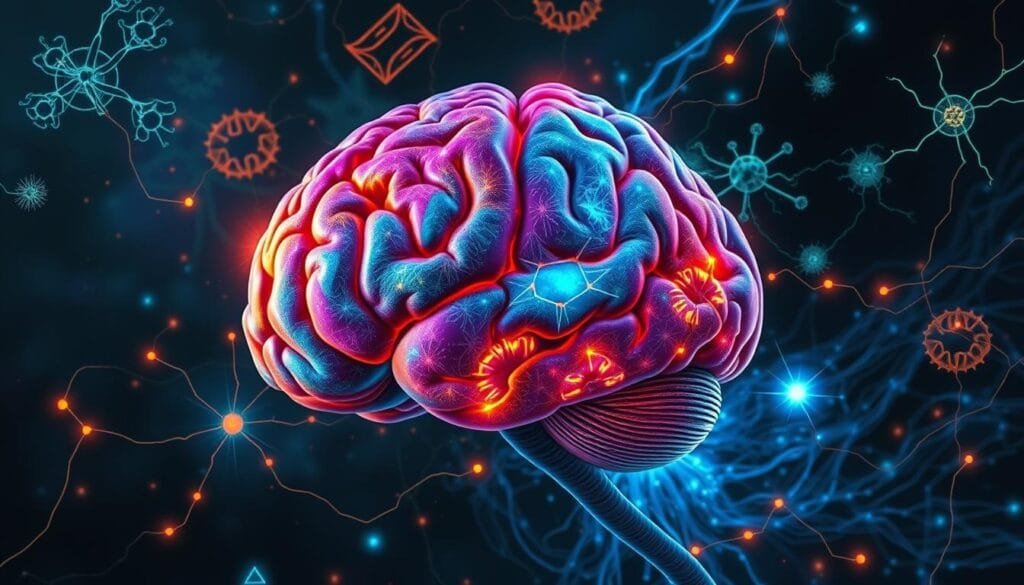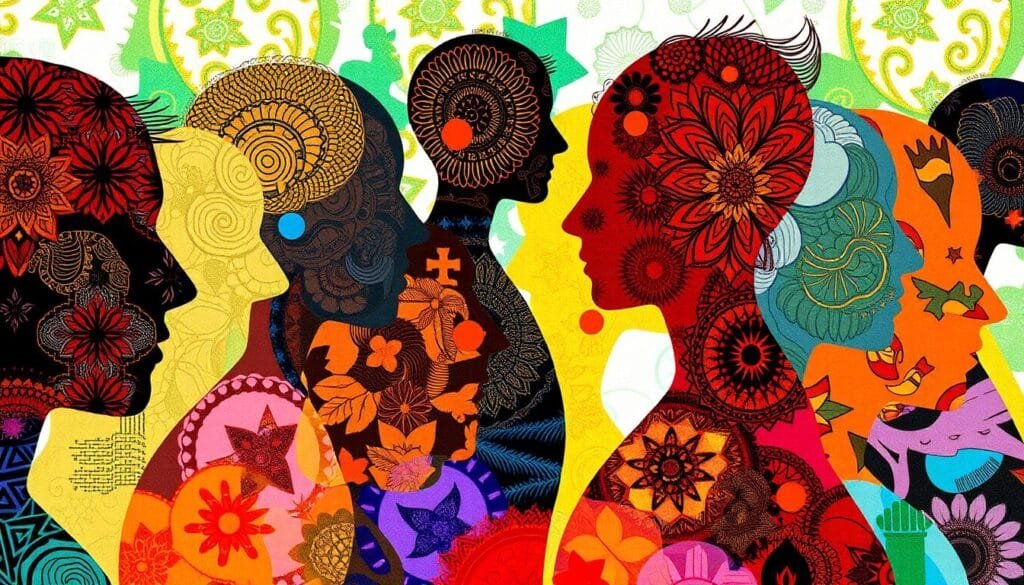Ever wondered what causes mental health struggles? I’ve faced my own battles and found them complex and layered. Searching for answers is a journey filled with uncertainty and a desire to find the root of our pain.
Diagnosing mental illness used to be more subjective than other diseases. Unlike physical illnesses, mental health conditions didn’t have clear biological signs. But, new discoveries in genetics and neuroimaging are changing this. They’re helping us understand the mind’s biology better.
Leaders like Dr. Eric Kandel and Dr. Thomas R. Insel are leading this change. They believe mental illnesses are biological diseases of the brain. This shift promises to bring new understanding and treatments to mental health.
Key Takeaways
- Mental illness diagnosis has historically lacked objective biological tests, but new tools in genetics and neuroimaging are advancing the understanding of underlying brain processes.
- Experts are increasingly viewing mental disorders as biological diseases that affect the brain, similar to how physical chronic conditions affect other organs.
- The field of mental health diagnosis and treatment is undergoing a transformative shift, paralleling the advancements seen in cardiology over the past century.
- Identifying the root causes of mental health problems, whether biological, genetic, or environmental, is crucial for developing more effective interventions and support systems.
- A comprehensive, multifaceted approach that considers various contributing factors is essential for addressing the complex nature of mental health issues.
Biological Factors and Brain Processes
The brain is key to our thoughts, emotions, and actions. Biological factors and brain processes greatly affect our mental health. They can lead to different mental health disorders.
The Brain as the Organ of the Mind
The brain is complex and always changing. Its structure and function are tied to our mental health. Neurological and functional brain abnormalities are linked to mental health issues like schizophrenia and bipolar disorder.
Neuroimaging has helped find specific brain areas and brain chemistry linked to these disorders. This knowledge is crucial for understanding and treating mental health problems.
Imbalances in neurotransmitters are connected to depression, anxiety, and addiction. Medications like SSRIs aim to balance these chemicals. This can help reduce symptoms of mental illness.
The link between the brain and mental health is complex. Genetic factors, environmental influences, and life experiences all play a role in mental health issues.
| Key Biological Factors in Mental Illness | Prevalence |
|---|---|
| Lifetime prevalence of mental disorders in children and adolescents | 13–18% of the Canadian population |
| Onset of mental disorders before age 14 | 50% of all lifetime cases |
| Onset of mental disorders by age 24 | 75% of all lifetime cases |
| Rates of mental disorders in the population of incarcerated youth | As high as 70% |
Understanding the brain’s role in mental health is crucial. It helps us tackle the complex nature of mental illness. This knowledge leads to better prevention, diagnosis, and treatment.
Genetic and Environmental Influences
Genetic predispositions and environmental factors both play big roles in mental health. Studies show that mental illnesses often run in families, hinting at a genetic link. But, things like stress, toxins, or substance use during pregnancy can also raise the risk of mental disorders.
Epigenetics is a new field that shows how the environment can change how genes work. For instance, childhood abuse can lead to brain changes that raise the risk of suicide. This mix of genetics and environment is key to understanding mental health problems.
| Genetic Factors | Environmental Factors |
|---|---|
|
|
The connection between genetics and environment is complex and still being studied. By understanding these factors, we can better prevent and treat mental health issues.
“The integration of nature and nurture is essential for understanding the development of mental health conditions.”
what causes mental health problems
Risk Factors for Mental Disorders
Mental health issues are complex. Many factors can lead to them. Knowing these factors helps us understand how mental disorders start.
Having a family history of mental illness is a big risk. In the U.S., over 1 in 5 adults have a mental illness. About 1 in 25 have serious conditions like schizophrenia or major depression. Genetics can play a part, but it’s not the only factor.
Life events like losing a loved one or dealing with financial problems can also affect mental health. Childhood or teenage trauma, such as severe abuse, can be very damaging. It can lead to mental disorders.
- Biological factors like brain abnormalities or chemical imbalances
- Environmental influences such as exposure to toxins or infections
- Substance abuse and poor nutrition
- Psychological factors like severe stress, neglect, and poor relational skills
- Social and economic inequalities, including unemployment, poverty, and poor living conditions
It’s important to know about all these risk factors. This helps us understand mental health problems better. By tackling these issues, we can improve prevention and treatment.
Neurological and Functional Brain Abnormalities
Recent studies in neuroscience have found specific brain issues linked to mental health problems. For example, a part of the brain called Brodmann area 25 is too active in people with depression. This area can be treated with deep brain stimulation, helping those with hard-to-treat depression.
Research also shows brain growth problems and connection issues in autism spectrum disorder. These findings suggest mental illnesses might be caused by specific brain problems, like physical diseases have specific causes.
Understanding these causes is key to better diagnosis and treatment. It helps us see mental health issues as real conditions, not just in our heads.
Functional neurological disorders (FNDs) are being studied too. These include conditions like functional movement disorders and seizures without a clear cause. Scientists think FNDs might be caused by genetics, environment, and psychology.
| Statistic | Value |
|---|---|
| Approximately 20% of Americans suffer from a diagnosable mental disorder in a given year | 1 in 5 people over the age of 18 |
| Four of the 10 leading causes of disability are major mental disorders | Depression, bipolar disorder, schizophrenia, and obsessive-compulsive disorder |
| About 3% of the population have more than one mental illness at a time | 3% |
| Around 5% of adults are affected so seriously by mental illness that it interferes with their ability to function in society | 5% |
Research and clinical trials are ongoing to understand FNDs better. They aim to find better ways to diagnose and treat these conditions. Treatments include psychotherapy, cognitive behavioral therapy, and mindfulness exercises, along with specific medications.
“Understanding the biological underpinnings of mental health conditions is crucial for improving diagnosis and treatment.”
The Role of Epigenetics
Research in epigenetics is revealing how our genes and environment interact in mental health. It shows how environmental factors can change how our genes work, without changing the DNA itself. This new knowledge helps us understand mental health conditions better.
Environmental Influences on Gene Expression
Studies show that stress and life events can affect our genes, making us more prone to mental health issues. For instance, rats born to neglectful mothers are more stressed as adults. People who have been abused as children also show different brain patterns when they die by suicide.
This research highlights the role of epigenetics in mental health problems like depression, schizophrenia, and bipolar disorder. It shows how the environment can change our genes, leading to new ways to treat mental illnesses.
| Study | Findings |
|---|---|
| “Epigenetic regulation of the neural transcriptome” (2010) | Epigenetic changes in the brain are linked to mental health issues. |
| “Epigenetics at the crossroads of genes and the environment” (2015) | Stress can cause epigenetic changes that affect our mental health. |
| “Common DNA methylation alterations in multiple brain regions in autism” (2014) | Epigenetics plays a big role in neurodevelopmental disorders. |
As we learn more about epigenetics and mental illness, we understand the link between genetic predispositions and environmental factors. This knowledge could lead to better treatments for mental health issues.
Psychological and Social Factors
While we often focus on biology and genetics, it’s key to see the impact of psychological and social factors. These elements play a big role in mental health issues.
Depression and anxiety, for example, might not have a clear biological cause. They can come from a mix of normal traits and environmental factors. Psychologist Jerome Wakefield, PhD, says mental illnesses can arise from normal traits becoming maladaptive in certain situations.
This view shows we need to look at psychological and social factors, not just biology. The psychological causes of mental health issues include many things. This includes relationships, family, culture, work, money, and where we live.
Life events like trauma, big changes, or stress can also affect mental health. It’s vital to understand how these factors interact. This helps us prevent and treat mental health problems better.
| Psychological Factors | Social Factors |
|---|---|
|
|
“Mental illnesses can sometimes arise from a chance combination of normal personality traits that become maladaptive in certain contexts, rather than clear-cut brain dysfunctions.”
By looking at the psychological causes of mental health issues and the social determinants of mental wellbeing, we can better understand mental health challenges. This helps us create solutions that support individuals and communities.
The Mental Hygiene Movement
As the 19th century ended, a new movement started in the United States. It focused on mental health challenges. The mental hygiene movement aimed to improve mental health through education and community efforts.
Historical Perspectives on Mental Health Prevention
The movement believed that industrialization and urbanization harmed mental health. People like Adolph Meyer and Clifford Beers pushed for a preventive approach. They wanted to help before mental illness started.
In 1909, the National Committee for Mental Hygiene was formed. It aimed to better mental health care and prevent illness. The movement greatly influenced public health and psychiatry, making mental health a key part of society.
Yet, the movement faced criticism for lacking scientific proof. It focused too much on social factors. Still, its impact is seen in today’s efforts to prevent mental health issues. It shows the importance of understanding mental health triggers and environmental contributors to mental health.
“The term mental hygiene was first used by William Sweetzer in 1843, and in 1893, Isaac Ray defined mental hygiene as ‘the art of preserving the mind against incidents and influences calculated to deteriorate its qualities.'”
Diagnostic Challenges and Heterogeneity
Diagnosing mental health issues is tough and different from physical diseases. Mental disorders are hard to spot because they show up in symptoms and behavior. These signs can change a lot from person to person.
For example, depression can mean many things to different people. A study says, “Depression is like cancer, with many different causes and needs.” This makes it hard to find one cause for many mental health problems.
Many mental health issues, like depression and anxiety, often happen together. A study in 2007 showed that depression and anxiety can both be present at the same time. This makes treating them even harder.
Genes and environment also play a big role in mental health problems. A study in 2009 found that schizophrenia and bipolar disorder share some genetic links. Another study in 2017 found a link between Autism and Obsessive-Compulsive Disorder.
Understanding the challenges in diagnosing mental health is key. By looking into the causes and how they interact, we can offer better care. This helps those dealing with mental health issues get the help they need.
“Just as cancer patients are a wildly diverse group marked by many different disease pathways, a depression diagnosis is likely to encompass people with many unique underlying problems.”
Multifactorial Nature of Mental Disorders
Mental health problems don’t come from one thing. They happen because of many factors like biology, psychology, and society. Knowing this helps us find better ways to prevent and treat them.
Genes and brain issues can lead to mental disorders. For example, schizophrenia and autism often have a strong biological link. But even normal traits can sometimes cause problems.
The Role of Epigenetics
Epigenetics shows how the environment can change our genes. Things like trauma, stress, and drugs can make our genes work differently. This can affect our mental health.
Psychological and social factors also matter a lot. Bad experiences, like abuse or bullying, can hurt our emotions. Our social status, healthcare access, and friends also play big roles in our mental health.
These factors mix together in complex ways. Understanding this helps doctors and researchers create better treatments. They aim for prevention, early help, and effective care.
| Contributing Factors | Examples |
|---|---|
| Biological | Genetic predispositions, neurological abnormalities, epigenetic changes |
| Psychological | Negative life experiences, emotional trauma, personality traits |
| Social | Socioeconomic status, access to healthcare, support networks |
“Mental disorders result from complex interactions between genes and environmental factors; there is no single genetic switch responsible for causing a mental disorder.”
Ongoing Research and Future Directions
Researchers are making exciting progress in understanding mental health. They are finding the biological roots of mental disorders. Advances in genetics, neuroimaging, and neuroscience are helping us see how the brain works in conditions like depression and schizophrenia.
But, they also know that mental illnesses are complex. They involve more than just biology. Factors like environment and social interactions play a big role too.
Future research will look at all these factors together. This will help us understand mental health problems better. New technologies will play a big part in this research.
Technology is changing how we study and treat mental health. Thousands of mental health apps are available in iTunes and Android app stores, and the number is growing every year. These apps help people manage their symptoms and track their progress.
Studies show that these apps can be very helpful. They are changing the way we approach mental health care. This is a big step forward.
The mental health crisis in the US is serious. 90% of the public believes there is a crisis. Half of young adults report feeling anxious always or often. We need new solutions to tackle this problem.
With ongoing research and new technology, we are on the verge of big breakthroughs. The future of mental health care looks promising.
“The future of mental health care lies in a nuanced, multifactorial approach that leverages the power of technology to drive meaningful change.”
As we move forward, researchers and practitioners are exploring new ways to tackle mental illness. They are studying the biological roots and using technology to make progress. This will lead to better care for individuals and communities.
Conclusion
Mental health problems have many causes. These include biological, genetic, psychological, and environmental factors. We’ve made progress in understanding brain issues linked to mental disorders. But, these conditions are different, making it hard to find solutions.
We need a new way to look at mental health. It should include a person’s biology, life experiences, and social setting. This approach will help us understand mental illness better. It will also lead to better ways to prevent and treat mental health issues.
If you’re dealing with mental health issues or want to know more, it’s important to understand the roots. Recognizing the complex causes is the first step. It helps us work towards better mental health for everyone in the United States.
FAQ
What are the biological factors that can contribute to mental health problems?
How do genetic and environmental influences interact to cause mental health issues?
What are some of the key risk factors for mental health problems?
How do neurological and functional brain abnormalities contribute to mental illness?
What is the role of epigenetics in the development of mental health problems?
How do psychological and social factors contribute to mental health issues?
What are the challenges in diagnosing and classifying mental illnesses?
Source Links
- The roots of mental illness – https://www.apa.org/monitor/2012/06/roots
- Mental illness – Symptoms and causes – https://www.mayoclinic.org/diseases-conditions/mental-illness/symptoms-causes/syc-20374968
- The Science of Brain and Biological Development: Implications for Mental Health Research, Practice and Policy – https://www.ncbi.nlm.nih.gov/pmc/articles/PMC3222573/
- Mental health: Definition, common disorders, early signs, and more – https://www.medicalnewstoday.com/articles/154543
- Unveiling the intricacies of neurochemicals: exploring their role in brain function and mental health – https://lpsonline.sas.upenn.edu/features/unveiling-intricacies-neurochemicals-exploring-their-role-brain-function-and-mental-health
- Environmental Connections: A Deeper Look into Mental Illness – https://www.ncbi.nlm.nih.gov/pmc/articles/PMC1940091/
- Gene-environment interactions in mental disorders – https://www.ncbi.nlm.nih.gov/pmc/articles/PMC1414673/
- About Mental Health – https://www.cdc.gov/mentalhealth/learn/index.htm
- Causes of Mental Illness – https://www.webmd.com/mental-health/mental-health-causes-mental-illness
- Information about Mental Illness and the Brain – NIH Curriculum Supplement Series – https://www.ncbi.nlm.nih.gov/books/NBK20369/
- Functional Neurologic Disorder – https://www.ninds.nih.gov/health-information/disorders/functional-neurologic-disorder
- Epigenetics in Neurological and Psychiatric Disorders: A Comprehensive Review of Current Understanding and Future Perspectives – https://www.ncbi.nlm.nih.gov/pmc/articles/PMC10446850/
- Epigenetic Basis of Mental Illness – https://www.ncbi.nlm.nih.gov/pmc/articles/PMC4826318/
- Factors that affect mental health – https://www.mentalhealth.org.uk/explore-mental-health/factors-affect-mental-health
- The social determinants of mental health and disorder: evidence, prevention and recommendations – https://www.ncbi.nlm.nih.gov/pmc/articles/PMC10786006/
- Mental disorders – https://www.who.int/news-room/fact-sheets/detail/mental-disorders
- Origins of Mental Health | Johns Hopkins Bloomberg School of Public Health – https://publichealth.jhu.edu/departments/mental-health/about/origins-of-mental-health
- Mental hygiene movement as a (r)evolutionary trend in public health in interwar Kaunas and Vilnius from 1918 to 1939 – https://www.ncbi.nlm.nih.gov/pmc/articles/PMC5287990/
- Methods and Challenges for Assessing Heterogeneity – https://www.ncbi.nlm.nih.gov/pmc/articles/PMC8404882/
- The Heterogeneity problem: Approaches to identify psychiatric subtypes – https://www.ncbi.nlm.nih.gov/pmc/articles/PMC6821457/
- Multifactorial discrimination as a fundamental cause of mental health inequities – https://www.ncbi.nlm.nih.gov/pmc/articles/PMC5336641/
- Inheriting Mental Disorders – https://www.healthychildren.org/English/health-issues/conditions/emotional-problems/Pages/Inheriting-Mental-Disorders.aspx
- Technology and the Future of Mental Health Treatment – https://www.nimh.nih.gov/health/topics/technology-and-the-future-of-mental-health-treatment
- Mental health care is in high demand. Psychologists are leveraging tech and peers to meet the need – https://www.apa.org/monitor/2024/01/trends-pathways-access-mental-health-care
- The State of Mental Health in America – https://mhanational.org/issues/state-mental-health-america
- Mental Disorders: MedlinePlus – https://medlineplus.gov/mentaldisorders.html
- Physical health and mental health – https://www.mentalhealth.org.uk/explore-mental-health/a-z-topics/physical-health-and-mental-health
- Frontiers | Factors That Predispose Undergraduates to Mental Issues: A Cumulative Literature Review for Future Research Perspectives – https://www.frontiersin.org/journals/public-health/articles/10.3389/fpubh.2022.831349/full











